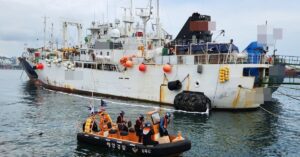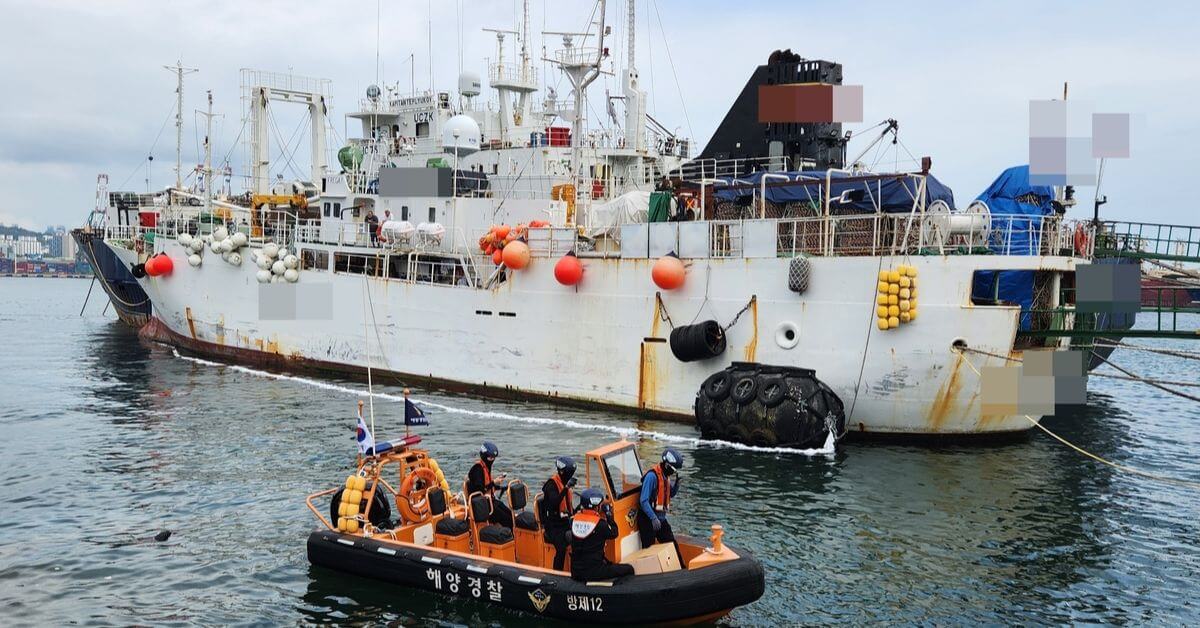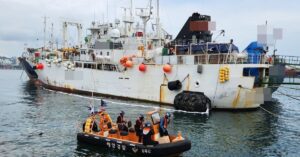
U.S. Navy Logistics Ship Arrives In Korea, Launching HD Hyundai’s First Major Maintenance Project
October 1, 2025
China’s Beihai Terminal Receives 7th LNG Shipment From Sanctioned Russian Project
October 1, 2025

The Busan Coast Guard has arrested a Russian-flagged refrigerated cargo ship suspected of leaking waste oil into the sea near Busan and fleeing the scene. The arrest was made after a four-day investigation involving drone tracking, sample analysis, and a full inspection of the ship.
On the morning of September 24, at 9:57 a.m., a female diver reported seeing “black oil of unknown origin” leaking into the sea in front of Cheonghak Riverside Park, Yeongdo-gu, Busan.
The Coast Guard responded quickly by deploying 12 anti-pollution ships and 12 marine pollution control personnel to the site. Containment work continued until 3:35 p.m. on the same day.
During the containment operation, the suspected vessel left the area. The Coast Guard launched a full-scale investigation to track the spill and identify the vessel responsible.
Using drones to monitor the spread of the oil slick and its movement, the Coast Guard narrowed their search and identified a 2,616-ton Russian-flagged refrigerated cargo ship, referred to as “K vessel,” as the suspect.
Investigators collected sea samples around the vessel and compared them with oil samples taken from inside the ship. The matching samples confirmed the vessel was the likely source of the spill.
A four-day inspection of the ship was carried out to trace the exact source of the leak. The Coast Guard thoroughly examined the engine room, valves, pipes, and tank lines, and found that waste oil had leaked into the sea during transfer for engine repairs.
The leakage was caused by a defect in an intermediate valve, which had deteriorated with age.
On September 27, the ship’s chief engineer, a 41-year-old Russian national, admitted the charges. He is under investigation without detention for violating the Marine Environment Management Act, which penalises both crew members and shipowners for marine pollution.
The Busan Coast Guard said it would calculate the costs of manpower and absorbent materials used during the containment operation and charge Mr. A and the ship’s operator for the expense.
Hwang Seon-ju, head of the Busan Coast Guard’s Marine Pollution Prevention Division, told the media that such cases are challenging, as they require both matching samples and proving the exact source of the leak on the ship. He described this case as the result of a thorough investigation and the persistent efforts of marine pollution prevention experts.
References: YNA, yonhapnewstv
Source: Maritime Shipping News


